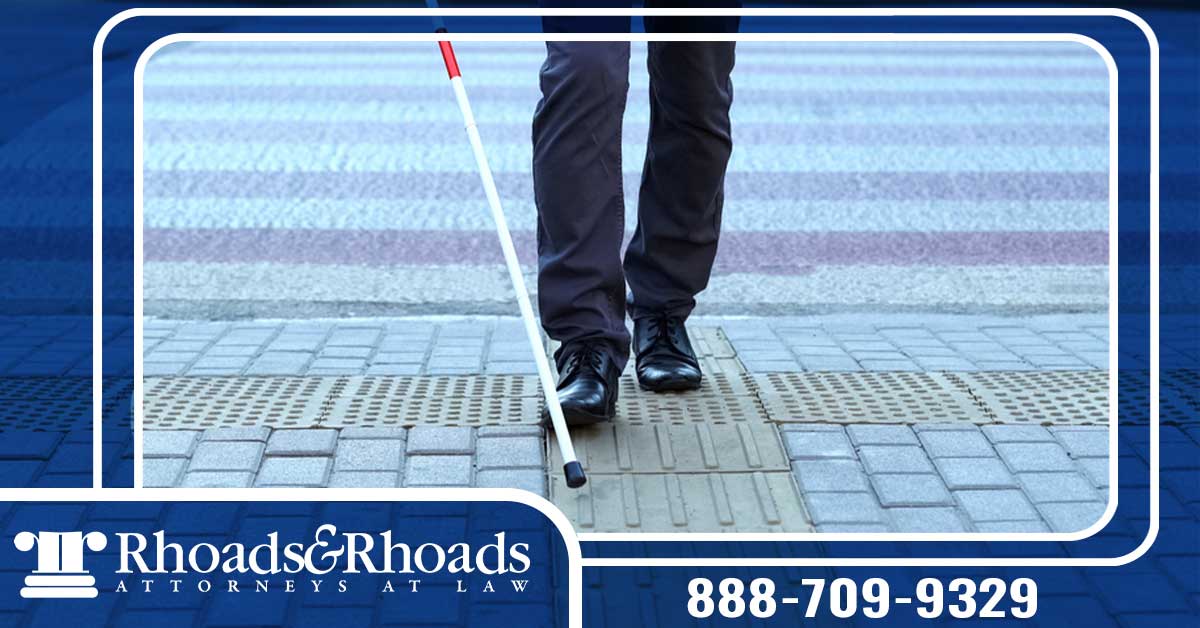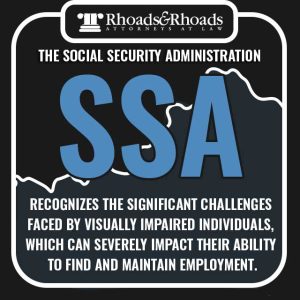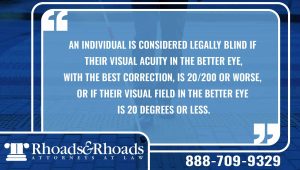
If you or a loved one is experiencing vision loss or total blindness, you may be wondering if you qualify for Social Security benefits. The process of applying for and receiving disability benefits can be complex, but understanding the rules and criteria is crucial, especially when it comes to visual impairments. In this comprehensive guide, we’ll explore the key factors that determine eligibility for disability benefits related to vision loss, the different types of benefits available, and how a Social Security attorney can assist you throughout the process.
The Social Security Administration (SSA) recognizes the significant challenges faced by visually impaired individuals, which can severely impact their ability to find and maintain employment. To address this, the SSA has established special standards to help those who are legally blind or have other qualifying visual impairments obtain help for their financial need through various disability benefit programs.
Understanding Legal Blindness and Statutory Blindness
 Before delving into the standards to become eligible, it’s essential to understand the definitions of “legal blindness” and “statutory blindness” as defined by the SSA. Being legally blind is a level of vision loss that meets specific criteria set by the SSA. An individual is considered legally blind if their visual acuity in the better eye, with the best correction, is 20/200 or worse, or if their visual field in the better eye is 20 degrees or less.
Before delving into the standards to become eligible, it’s essential to understand the definitions of “legal blindness” and “statutory blindness” as defined by the SSA. Being legally blind is a level of vision loss that meets specific criteria set by the SSA. An individual is considered legally blind if their visual acuity in the better eye, with the best correction, is 20/200 or worse, or if their visual field in the better eye is 20 degrees or less.
On the other hand, this is a more stringent standard used by the SSA representative to determine eligibility for certain disability benefits. An individual is considered statutorily blind if their visual acuity in the better eye, with the best correction, is 20/200 or worse, or if their visual field in the better eye is 20 degrees or less, and they also meet additional standards related to their ability to work.
While visual acuity is a key factor in determining blindness, the Social Security Administration (SSA) also considers an individual’s peripheral vision when evaluating disability benefits for a person. Peripheral vision refers to the ability to see objects and movement outside of the direct line of sight, or what you can see straight ahead of you when looking forward.
Even if a person does not meet the standards for blindness based on visual acuity alone, they may still qualify for disability benefits if their peripheral vision is significantly limited or if they have low vision that impacts their overall visual efficiency and ability to work or if the vision problems cause other issues such as debilitating headaches. The SSA will assess the residual functional capacity of the person, which evaluates what work-related activities they can still perform despite their visual challenges.
Qualifying for Benefits with Vision Loss or Low Vision
For a person to qualify for Social Security benefits due to vision loss, you must meet the specifics outlined in the SSA’s “Blue Book,” which is an important source, listing impairments that may qualify an individual for benefits.
The Blue Book listings specifically related to vision loss include:
- Listing 2.02: Impairment of central visual acuity
- Listing 2.03: Contraction of the visual field in the better eye
- Listing 2.04: Loss of visual efficiency or impairment of visual fields
If you meet the standards for one of these listings, you may be eligible for Social Security Disability Insurance (SSDI) or Supplemental Security Income (SSI) benefits.
Social Security Disability Insurance (SSDI)
SSDI benefits are available to individuals who have worked and paid Social Security taxes for a sufficient period of time, also known as earning “work credits.” The number of work credits required depends on your age at the time of disability. If you meet the work credit requirements and your vision loss meets the SSA’s standards, you may be eligible for SSDI benefits.
Supplemental Security Income (SSI)
SSI is a need-based program that provides financial assistance to individuals with limited income and resources, regardless of their work history.
To qualify for SSI benefits due to vision loss, you must meet the SSA’s medical criteria and also have limited income and resources below the established thresholds.
Special Rules for Blind Individuals
The SSA has implemented considerations for individuals who are legally blind or statutorily blind, acknowledging the unique challenges they face in finding and maintaining employment.
These include:
-
 Higher Substantial Gainful Activity (SGA) limits: The SGA limit is the maximum amount an individual can earn while being able to receive benefits. For those who are legally blind, the SGA limit is higher than for those with other disabilities.
Higher Substantial Gainful Activity (SGA) limits: The SGA limit is the maximum amount an individual can earn while being able to receive benefits. For those who are legally blind, the SGA limit is higher than for those with other disabilities. - Exclusion of income from self-employment: The SSA does not consider income earned from self-employment when determining eligibility for those who are legally blind.
- Continued Social Security disability payments for older individuals: Individuals who are 55 or older and receiving benefits can earn above the SGA limit without having their benefits terminated, as long as their work requires a lower skill level than their previous employment.
- Disability “freeze”: Those who become legally blind can request a disability “freeze,” which prevents their lower earnings after becoming blind from reducing their future Social Security retirement benefits.
Proving Vision Loss or Blindness
For a person to be eligible for disability benefits due to vision loss, you must provide sufficient medical evidence to support your claim.
This may include:
- Comprehensive eye examinations and test results from licensed ophthalmologists or optometrists
- Tests and measurements of central visual acuity
- Medical records detailing the cause, progression, and severity of your vision impairment
- Information about any other medical conditions that may contribute to your disability
The SSA may also request additional testing or independent medical examinations to verify the extent of your visual impairment and its impact on your ability to work.
The Role of a Social Security Disability Attorney
 Applying for Social Security benefits can be a complex and overwhelming process for any person. Many initial claims are denied. This is where a knowledgeable and experienced Social Security attorney can be invaluable. Contact us today to discuss your case at 888-709-9329.
Applying for Social Security benefits can be a complex and overwhelming process for any person. Many initial claims are denied. This is where a knowledgeable and experienced Social Security attorney can be invaluable. Contact us today to discuss your case at 888-709-9329.
A disability attorney can assist you in several ways, including:
- Determining eligibility: An attorney can review your specific situation or medical condition to determine if you meet the criteria for disability benefits due to vision loss.
- Gathering and presenting evidence: Your attorney will ensure that all necessary medical documentation is properly gathered and presented to the SSA.
- Navigating the application process: Disability attorneys are familiar with the intricate rules and procedures involved in applying for benefits.
- Appealing denials: If your initial claim is denied, a disability attorney can represent you during the appeals process.
- Handling communications: Your attorney will handle all communications with the SSA, reducing the stress and burden on you during the application or appeals process.
At Rhoads & Rhoads, we understand the unique challenges faced by individuals with vision loss or blindness. Our experienced Social Security disability attorneys are dedicated to helping you navigate the complex benefits system and secure the financial assistance you need. Contact us today at 888-709-9329.
If you or a loved one is struggling with visual impairment and considering applying for disability benefits, don’t hesitate to reach out to us for a free consultation.
Vision Loss Disability FAQs
Does legal blindness qualify for disability?
Yes, legally blind individuals may qualify for Social Security disability benefits if their vision loss meets the criteria outlined in the SSA’s “Blue Book” listings for visual impairments. Legal blindness is defined as having a central visual acuity of 20/200 or worse in the better eye with best correction, or a visual field of 20 degrees or less in the better eye.
Presumptive blindness may also be granted if an individual has a visual capacity of 20% or less in their better eye.
What evidence do I need to prove blindness for disability?
To prove being blind for disability purposes, you will need to provide comprehensive medical evidence from licensed ophthalmologists or optometrists.
In certain circumstances, this may include eye examination reports, visual field efficiency tests, measurements of central visual acuity, and documentation of the cause and progression of your vision loss.
Can I work and still receive disability benefits for blindness?
Yes, the SSA has rules that allow legally blind individuals to earn a higher level of income through substantial gainful activity (SGA) without losing their disability benefits. Additionally, income from self-employment is excluded when determining who will qualify for benefits for those who are legally blind.
It’s important to note that even if you are legally blind or have significant vision loss, your disability benefits can be impacted by your income level and ability to work other jobs that may not require excellent vision.
How much can I earn and still receive Social Security disability benefits for being blind?
The SGA limit for legally blind individuals is higher than for those with other disabilities. In 2023, the SGA limit for legally blind individuals is $2,460 per month, compared to $1,470 for non-blind individuals.
Can I receive disability benefits if I’m not totally blind?
Yes, you may still be eligible for disability benefits if you have significant vision loss or impairment, even if you don’t meet the criteria for legal blindness. The SSA evaluates your overall visual efficiency, including visual acuity, and other factors, to determine if your vision impairment is severe enough to qualify for benefits.
What if my disability claim for blindness is denied?
If your initial claim for disability benefits due to blindness is denied, you have the right to appeal the decision. A Social Security attorney can represent you during the appeals process, gathering additional evidence, and advocating for your rights to receive the benefits you deserve.
How can a disability attorney help with my vision loss claim?
A disability attorney can assist you throughout the entire process of applying for or appealing a disability claim related to vision loss or blindness. They can help determine your eligibility, gather and present evidence, navigate the complex application process, handle communications with the SSA, and represent you during appeals if your claim is initially denied.
Contact Rhoads & Rhoads Law Firm
Having an experienced disability attorney by your side can significantly increase your chances of receiving the benefits you need and deserve.
Contact Rhoads & Rhoads today by calling 888-709-9329 or filling out our online form to schedule your free, no-obligation consultation. Let us fight for the financial assistance you or your family members deserve so you can focus on your health and well-being.


